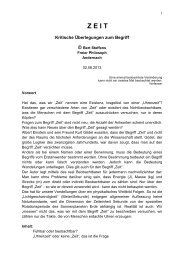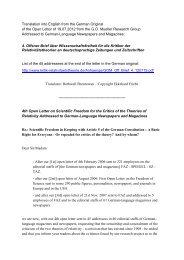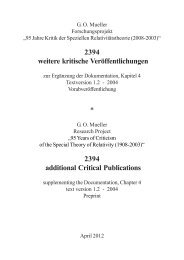1. The Need of New Approaches - Kritische Stimmen zur ...
1. The Need of New Approaches - Kritische Stimmen zur ...
1. The Need of New Approaches - Kritische Stimmen zur ...
You also want an ePaper? Increase the reach of your titles
YUMPU automatically turns print PDFs into web optimized ePapers that Google loves.
Chapter 9: <strong>The</strong> Thought Experiment<br />
<strong>The</strong> representatives <strong>of</strong> this group will be referred to in what follows as “the accountable”. <strong>The</strong>y have normally<br />
had better chances <strong>of</strong> receiving an all-round education, they have access to more information and competent<br />
assistance, and they claim in general to have insight and to be able to judge independently. What are the reasons and<br />
motives <strong>of</strong> the accountable for not responding to the serious information received by them (e.g. the information on<br />
the final nuclear-waste disposal site Asse, or on the spying affair <strong>of</strong> the Telekom or on the bribery affair at Siemens)<br />
in a businesslike manner?<br />
What a businesslike treatment here means cannot be anything doubtful. If the subject matter is a basic right that<br />
has been breached for decades right up to the present day, no one can claim that he or she, acting in good faith, had<br />
thrown the matter in the wastepaper basket due to its insignificance. Each <strong>of</strong> the addressees would have to have<br />
gained an impression, whether personally or via employees or through other colleagues, about what the matter dealt<br />
with. And in this case he or she would have to have realized that it dealt with a problem area <strong>of</strong> some significance.<br />
And exactly this realization as to the possible significance would have meant that a judgement as to the quality <strong>of</strong><br />
the documentation would have to be made, everything else being dependent on this. All <strong>of</strong> the addressees would<br />
react in this way up to this point, because they would also do so in the cases <strong>of</strong> Asse, Telekom and Siemens.<br />
All further steps depend essentially on personal prejudices and judgement, from preferences, moods and<br />
coincidences. Various alternatives are readily imaginable.<br />
(1) Some will reject without examining, because they know that the genius and the great luminaries are<br />
invariably infallible, except when they correct themselves.<br />
(2) Some will enquire by physicists and will receive the reassurance that the criticism is unfounded.<br />
(3) Some will take a look at the documentation, which will at least give an indication <strong>of</strong> the possible dimensions<br />
involved, and will say to themselves: if there is anything to this, things could become very uncomfortable - so better<br />
to have nothing to do with it and keep one’s head down.<br />
(4) A few will try to check whether the documentation gives correct descriptions and reports. This is already<br />
quite a bit <strong>of</strong> work. Some will have doubts, and therefore a good reason for seeing the matter as settled.<br />
(5) <strong>The</strong> very few who examine the work and see the correctness <strong>of</strong> the documentation as being confirmed will<br />
discuss, with colleagues, the dangers <strong>of</strong> presenting it to the public and the consequences for one’s own interests, and<br />
they will jointly decide to undertake nothing whatsoever. <strong>The</strong> typical national cases <strong>of</strong> Asse, Telekom and Siemens<br />
show that all <strong>of</strong> those informed prevented public clarification right up to the bitter end. And it was only after the<br />
bitter end that the matter was clarified as “brutally as possible”. In particular, experience shows that those actually<br />
responsible for control tend to make deals with the criminals for as long as possible.<br />
<strong>The</strong>se are the five most probable responses <strong>of</strong> the addressees. <strong>The</strong>y will have no interest in contacting the<br />
authors <strong>of</strong> the letters and publications received.<br />
A further constellation <strong>of</strong> possibly considerable influence - it would be the sixth - should at least be mentioned.<br />
<strong>The</strong> demand for scientific freedom (in the name <strong>of</strong> “unity <strong>of</strong> the sciences”) for a specialist field <strong>of</strong> the natural<br />
sciences sent to the accountable <strong>of</strong> all specialist areas could possibly have fallen into the deep-eaten - and therefore,<br />
<strong>of</strong> course, publicly always strongly denied - cleft between the natural sciences and the humanities. <strong>The</strong> one group<br />
regards the other (the scientists) as philistines, and the other regards the one (those <strong>of</strong> the arts faculties) as<br />
crackpots. Furthermore, a recent decision has meant that the explorers <strong>of</strong> the verse <strong>of</strong> Homer must now also seek<br />
third-party donations from sponsors and must develop their product’s marketability. This could perhaps give rise,<br />
on the part <strong>of</strong> the members <strong>of</strong> the arts faculties, to a somewhat foolish, malicious glee about how these “philistines”<br />
handle each other, instead <strong>of</strong> making a commitment to a basic right. Since the critics are clearly playing on the side<br />
<strong>of</strong> the philistines, they can see where they land. Those committed to the humanities have enough to do fighting for<br />
their own rights. Which “unity <strong>of</strong> the sciences” might it have to do with?<br />
Such arrogance and misplaced gloating by the members <strong>of</strong> the humanities over the “philistines” stems, <strong>of</strong><br />
course, from the certainty that in its own subjects such a criminally complete expulsion <strong>of</strong> critics from a specialist<br />
field and the subsequent watertight secrecy as to this state <strong>of</strong> affairs, over many decades, vis-à-vis the public could<br />
not even be imagined in the humanities. It would be much too boring. <strong>The</strong> abyss between the two camps cannot be<br />
bridged. For this reason the members <strong>of</strong> the humanities, in their “Heidelberg Appeal” in the copyright dispute with<br />
GOOGLE, naturally had no supporting signatures from natural scientists (Tagesspiegel, 2.5.09). In these structures,<br />
the critics expelled from theoretical physics cannot awaken any understanding on the other side.<br />
We believe we know roughly what the silence is intended to say to us. Most <strong>of</strong> our addressees are probably in a<br />
severe state <strong>of</strong> shock, though they are possibly also possessed by a feeling <strong>of</strong> superiority vis-à-vis completely<br />
unimaginable criminal intrigues. In fear <strong>of</strong> the devastating consequences <strong>of</strong> an uncovering, none <strong>of</strong> them wants to<br />
make a mistake. <strong>The</strong>y have all decided to behave as though they didn’t even exist. Perhaps some even despise the<br />
critics.<br />
2012<br />
33<br />
G. O. Mueller: STR





